

The Vermont Socialist - GMDSA newsletter (8/30/25): Storm the fort

Kids in Vermont have gone back to school. On their first day after the summer vacation, Windham County students may have expected to say hello again to their usual bus drivers, but that'll have to wait. Travel Kuz, the supervisory union's transportation contractor, has locked out members of Teamsters Local 597 and brought in scabs.
Bus drivers and monitors responded to their bosses' refusal to bargain by organizing pickets. On Wednesday, Travel Kuz sent them a cease-and-desist letter, calling a demonstration at Brattleboro Union High School "unlawful" and "unsafe." Local law enforcement disagreed.
The Teamsters want Windham Southeast superintendent Mark Speno to pressure Travel Kuz to end the lockout and have encouraged allies to contact him. Tell Speno (802-254-3730, mspeno@wsesdvt.org) to support the transportation workers' fight for fair wages and benefits. You can even attend the next school board meeting.
Follow Local 597's Facebook page for the latest updates. An injury to one is an injury to all.
And speaking of the Teamsters, you may see some of them in Burlington at the Labor Day Solidarity March, Rally & Picnic. Dozens of unions and activist organizations (including Green Mountain DSA) have endorsed the event.
You can help us get ready by joining us at Migrant Justice (179 S. Winooski Ave., Burlington) today (8/30) at 4 p.m. to create art for the rally. Feel free to bring materials.
We expect a massive turnout for the rally itself. Meet us at Battery Park at 1 p.m. on Monday, Sept 1. Labor Day belongs to workers.
Unfortunately, as the schoolkids already know, Labor Day also means that summer is over. Thanks for the memories – here are a few shots from our chapter's barbecue at Oakledge Park.
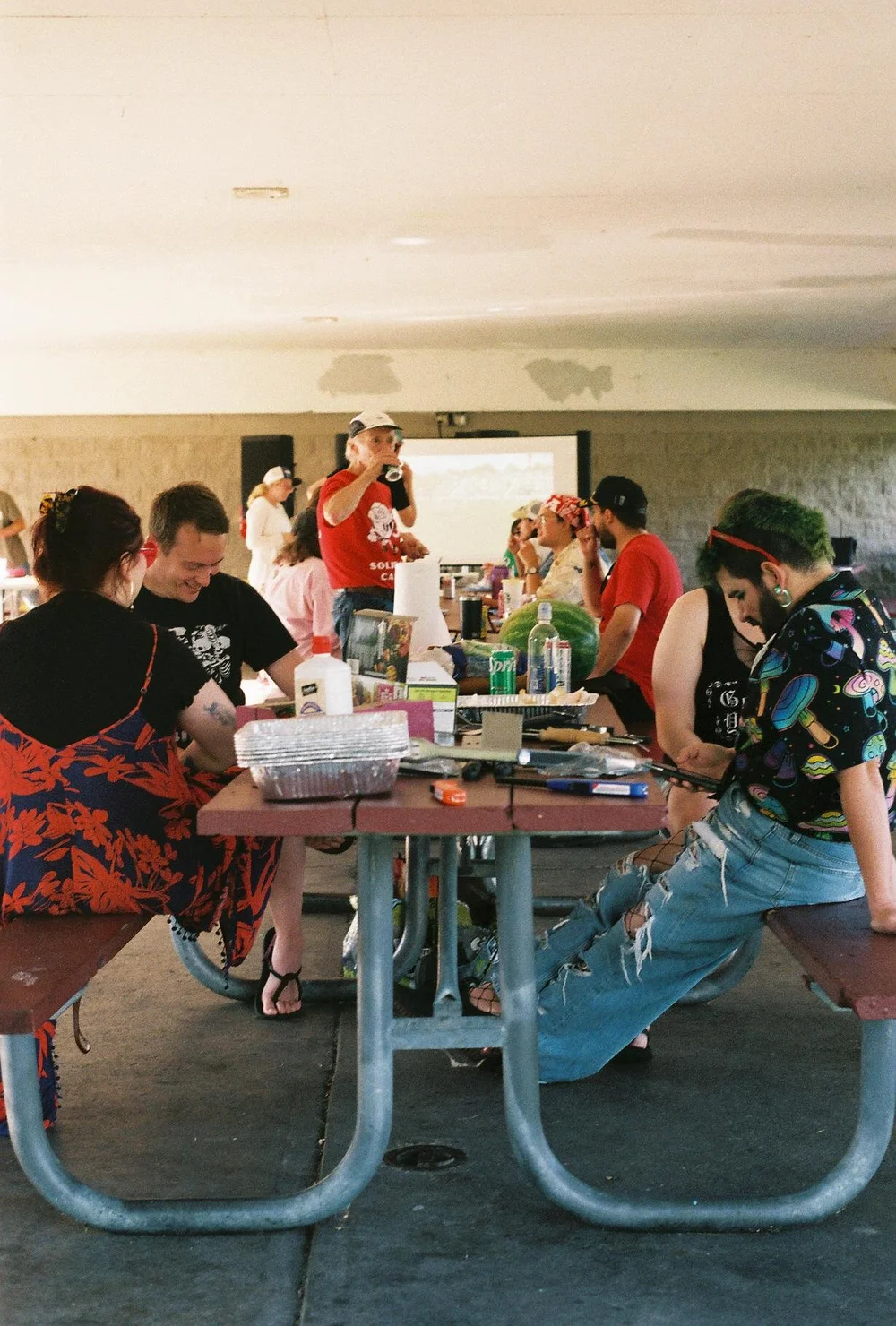
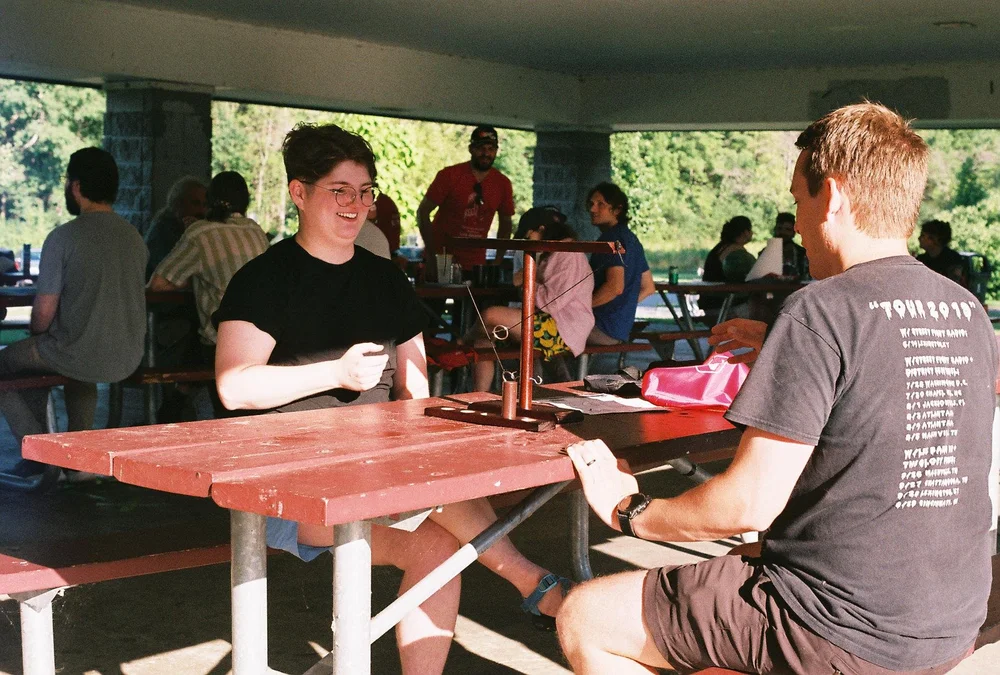
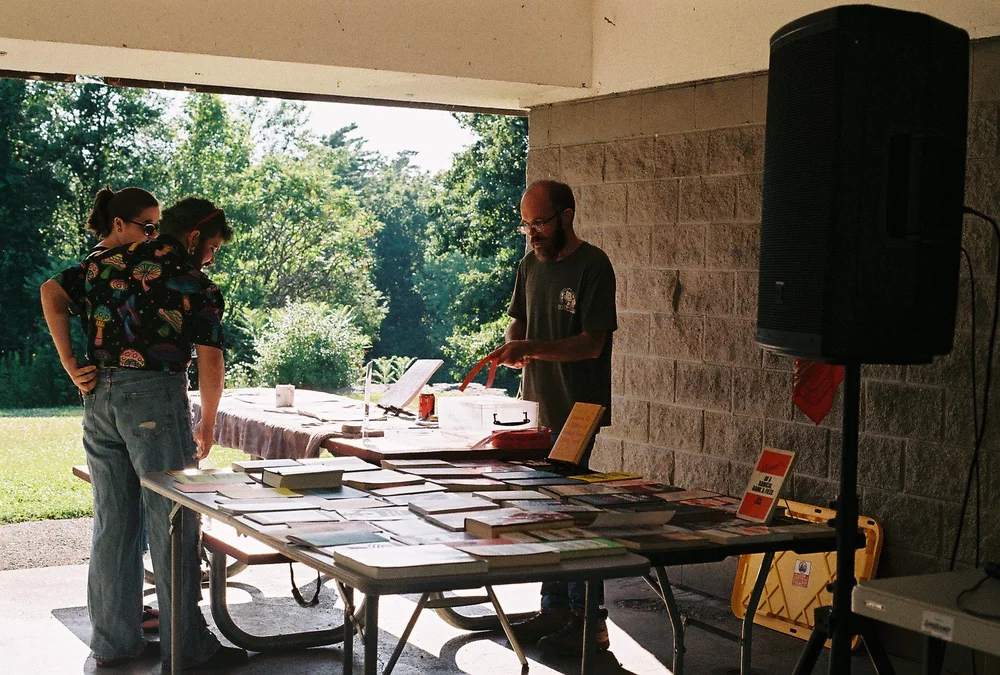
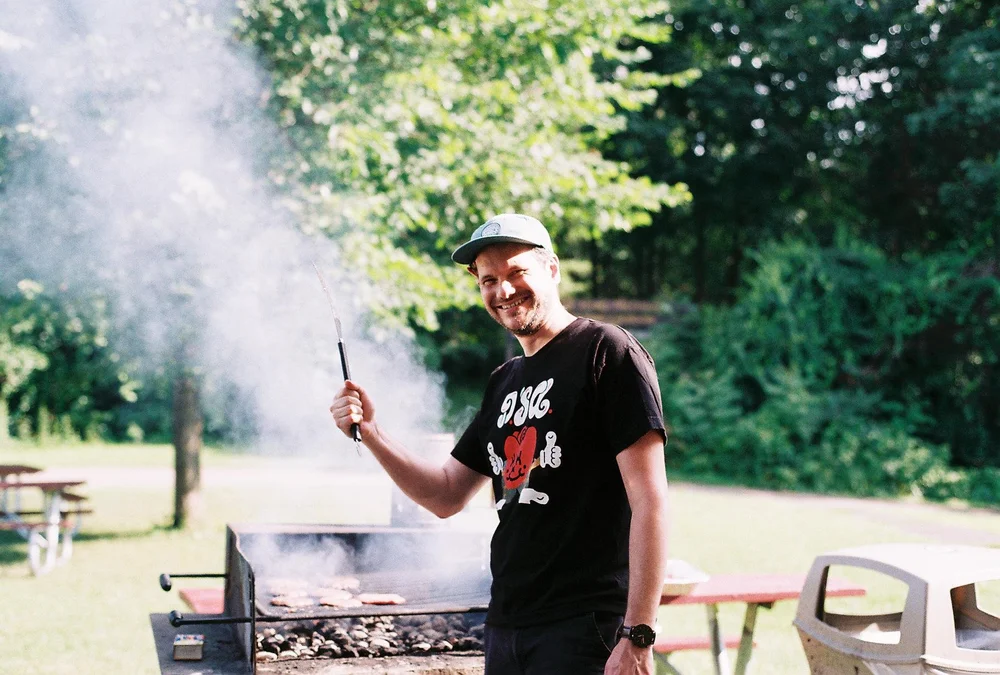
GMDSA MEETINGS & EVENTS
🚲 In order to avoid a conflict with the Labor Day rally, GMDSA's Urbanism Committee will meet on Tuesday, Sept. 2, at 6 p.m. on Zoom.
👋 Find out how you can help our Membership Committee improve recruitment and involvement in our chapter on Thursday, Sept. 4, and Tuesday, Sept. 23, at 6 p.m. on Zoom.
🧑🏭 Our Labor Committee will hold its next meeting on Monday, Sept. 8, at 6 p.m. on Zoom.
🔨 Talk about your job and learn about shop-floor organizing from peers at Workers' Circle (co-hosted by the Green Mountain IWW) on the second and fourth Wednesdays of each month, including Sept. 10, at 6 p.m. at Migrant Justice (179 S. Winooski Ave., Burlington).
🍿 Socialist Film Club will host another backyard screening in Burlington on Friday, Sept. 12, at 7 p.m. Please email us for more information if you're interested.
🗳️ The next meeting of our Electoral Committee will take place on Wednesday, Sept. 17, at 6 p.m. on Zoom.
🤝 GMDSA's East Branch and West Branch will come together for a general meeting on Saturday, Sept. 20, at 11 a.m. at Montpelier's Christ Episcopal Church (64 State St.), with an optional orientation for newcomers at 10 a.m.
🍉 Our Palestine Solidarity Committee will meet on Monday, Sept. 29, at 7 p.m. on Zoom.
STATE & LOCAL NEWS
📰 GMDSA-endorsed state senator Tanya Vyhovsky (Chittenden-Central) toured Ukraine, meeting with activists, politicians, students, and trade unionists.
📰 Protesting the Trump administration, Vermonters and Quebecois gathered at the US-Canada line in an expression of international solidarity.
COMMUNITY FLYERS
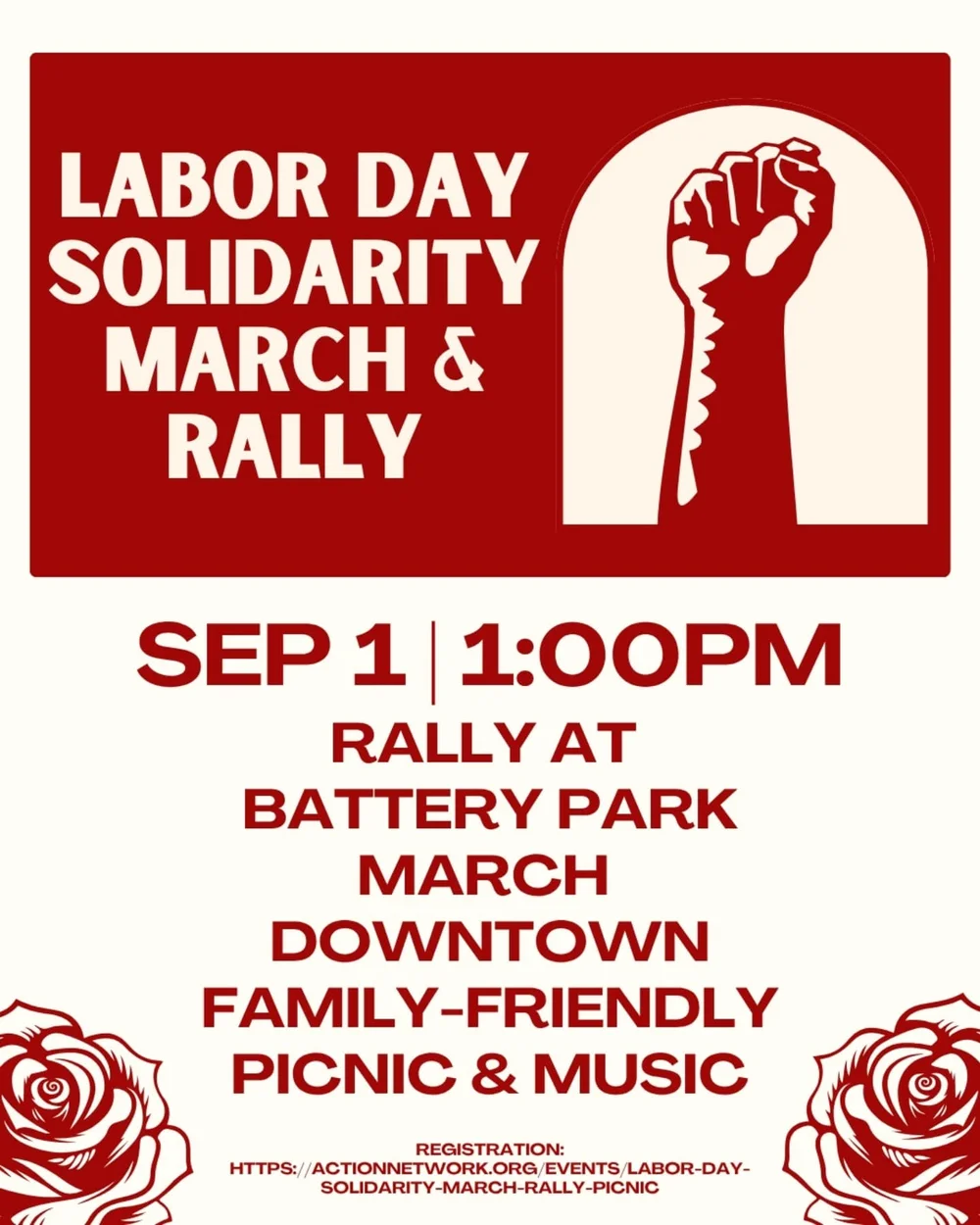
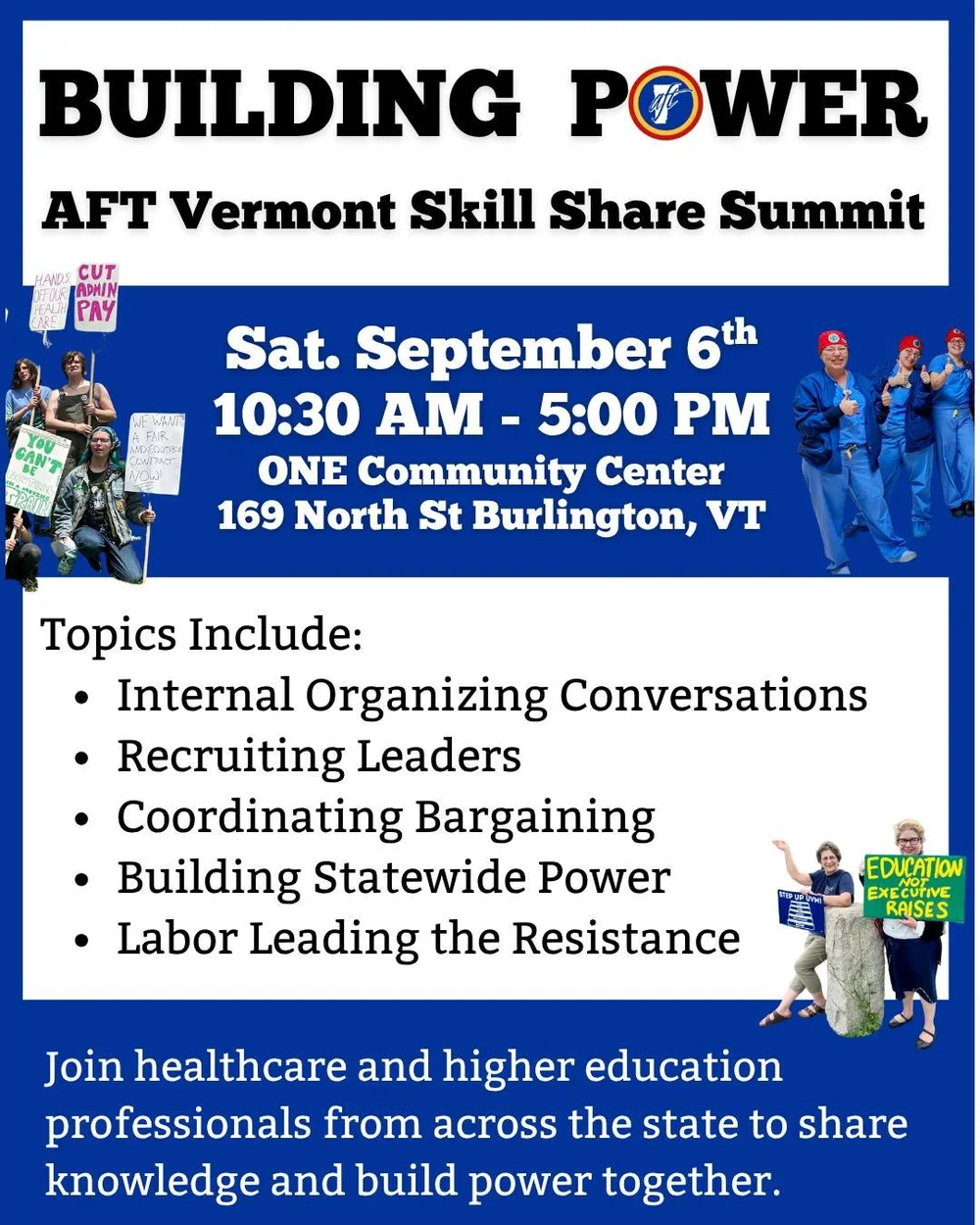
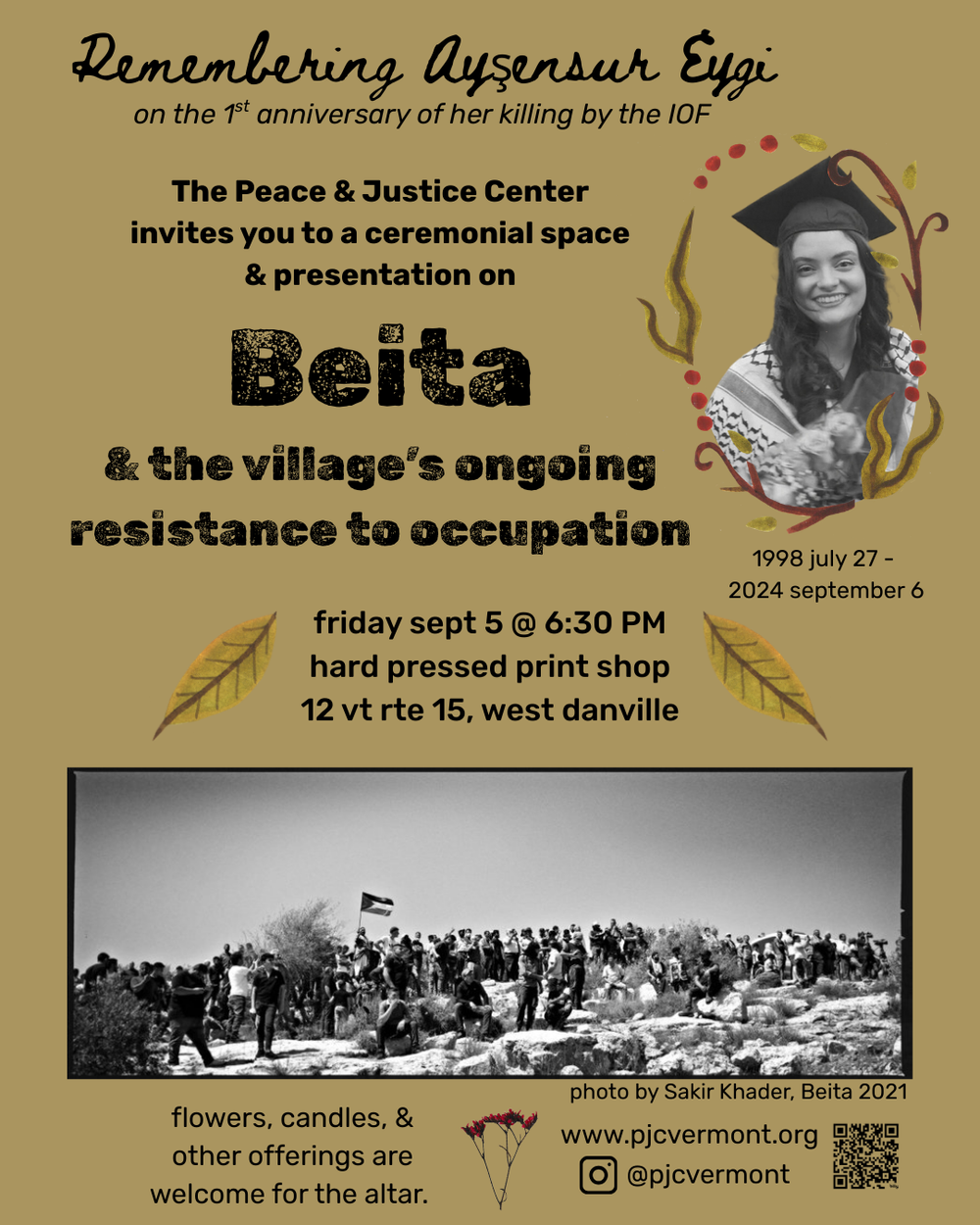



DSA IC Condemns US-brokered “peace” eroding Armenia’s sovereignty and rewarding Azerbaijan’s genocide in Artsakh
The Democratic Socialists of America International Committee (DSA IC) unequivocally condemns the “peace” plan brokered by President Donald Trump between Armenia and Azerbaijan. We call on the United States to immediately reverse course and ensure that any peace agreement is finalized with full consequences for Azerbaijan’s officials for perpetrating a genocide against the indigenous Armenians of Artsakh (also known as Nagorno-Karabakh). This means ensuring the right of return for Artsakh Armenians, recognition of their right to self-determination, and prosecution for crimes against humanity by Azerbaijan’s ethno-supremacist government under Ilham Aliyev.
Nearly two years ago, Azerbaijan finalized a brutal assault on the de facto autonomous region of Artsakh, besieging, starving, and ultimately expelling the native Armenian population. As the world first saw in 2020, this assault was made possible by U.S. complicity in the actions of two of its allies, Turkey and Israel. Despite State Department Acting Assistant Secretary Yuri Kim assuring the world that “the United States will not countenance any action or effort—short-term or long-term—to ethnically cleanse or commit other atrocities against the Armenian population of Nagorno-Karabakh,” the United States did exactly that.
Despite Azerbaijan’s documented and numerous crimes against humanity, its occupation of sovereign Armenian territory, and its genocide of Artsakh’s Armenian population, administrations of both major parties have now acquiesced to this regime’s demands. This includes repeatedly waving Section 907 of the Freedom Support Act to send American tax dollars to arm the Azerbaijani military. The shameful situation can be explained by the geopolitics of the South Caucasus.
Turkey, for its part, continues to engage in vehement denial of the 1915 Armenian Genocide and uses fascistic, hyper-nationalist rhetoric both at home and in its foreign policy. Towards Azerbaijan, this means advancing Pan-Turkism, which largely scapegoats Armenians as an inferior and sub-human people worthy of extermination in order to create a contiguous Turkic nation. Both Turkish President Reccep Erdogan and Azerbaijani President Aliyev have, for instance, publicly praised the actions of the perpetrators of the 1915 Armenian Genocide and their immediate underlings repeatedly advance the idea of “completing” the task. However, support for Azerbaijan from U.S. allies neither starts nor ends with Turkey.
Israel, since the fall of the Soviet Union, has cultivated a deep relationship with Azerbaijan. Reports suggest that Azerbaijan continues to be one of the top three energy suppliers of Israel. In exchange, Israel sells weapons to and tests developing systems in partnership with Azerbaijan’s military. In fact, around 70 percent of Azerbaijan’s weapons are reported to come from Israel. In 2020, Israeli drones were a key factor in Azerbaijan’s victory over Armenian forces protecting Artsakh. It is likely for this reason that Israel also proudly denies the Armenian Genocide even today. Furthermore, Israel views Azerbaijan as a key geostrategic asset to gain leverage, intelligence, and supremacy over Iran, with a number of Israeli bases being hosted close to the Iranian border.
The U.S.should not sacrifice Artsakh’s Armenians on an altar to these two genocidal allies. Assisting Azerbaijan in whitewashing genocide in exchange for oil to flow from Baku to Europe and Israel and to further Pan-Turkism is criminal. As socialists, we recognize that the dignity of any people should not be contingent on their value to global capital. Tragically, this peace plan does exactly the opposite: subjugating Armenia at the expense of profit, Pan-Turkism, and Zionism. The Armenians of Artsakh have been indigenous to the region for millennia, with some of the Armenian people’s earliest cultural heritage originating in the area. Their right to self-determination is inalienable and the right of return for the over 100,000 forcibly displaced people must be part of any U.S. brokered peace along with release of prisoners of war, political prisoners, and withdrawal from occupied lands.
This injustice is compounded by the provision for a 99-year, privatized lease on a transit corridor for Azerbaijan that would cut through the Armenian region of Syunik. Profiteering on a route that will likely be used by Turkey and Israel to supply weapons to Azerbaijan to use against Armenia or Iran. The creation of such a route also calls into question Armenian sovereignty, as the corridor would potentially cut off Armenia from its only friendly neighbor, Iran.
This would undeniably be an extension of American neo-colonial power into Armenia that, as history suggests for 99-year leases, any future Armenian government will find incredibly difficult to get out of. Troublingly, U.S. diplomatic history is checkered with interventions into smaller, less powerful countries to uphold such strategic trade routes and enrich private enterprises. This includes the Panama Canal in Panama, United Fruit in Guatemala, the overthrow of Iran’s democratically elected government, and the military takeover of Chile. This history must not be allowed to repeat itself in Armenia. Instead, the United States must go back to the table and reverse the genocide of Artsakh Armenians.
Democratic Socialists of America’s International Committee stands with oppressed people around the world fighting for liberation against imperialism, racism, and capitalism. From Palestine, to the Congo, to Sudan, to Armenia and Artsakh, and beyond, we recognize that these struggles are interconnected. In solidarity with comrades around the world, we strongly condemn this reprehensible proposal and call on the US government to change course.
Ամերիկայի Միացյալ Նահանգների Սոցիալիստ Դեմոկրատների Միջազգային Կոմիտեն (DSA IC) անկասկած դատապարտում է «խաղաղության» այն ծրագիրը, որ միջնորդեց նախագահ Դոնալդ Թրամփը Հայաստանի եւ Ատրպէյճանի միջեւ։ Մենք կոչումէնք անում Միացյալ Նահանգներին որ անմիջապես փոխել ընթացքը եւ ապահովել, որ խաղաղության որեւէ համաձայնագիր կնքուի միայն այն դէպքում, երբ Ատրպէյճանի պաշտօնյաները կ’ենթարկուին լիարժէք հետեւանքներու՝ Արցախի (նաեւ յայտնի իբրեւ Լեռնային Ղարաբաղ) բնիկ հայության դէմ իրականացրած ցեղասպանության համար։ Սա նշանակում է ապահովել արցախահայության վերադարձի իրաւունքը, նրանց ինքնորոշման իրաւունքի ճանաչումը, նաեւ Ատրպէյճանի էթնօ-գերազանցական վարչակարգի՝ Իլհամ Ալիեւի գլխաւորությամբ, մարդու դէմ ոճիրներու համար դատապարտումը։
Մօտ երկու տարի առաջ Ատրպէյճանը աւարտեց դաժան յարձակում Արցախի փաստացի ինքնավար շրջանի վրայ՝ պաշարելով, սովամահ անելով եւ ի վերջոյ արտաքսելով բնիկ հայ բնակչութիւնը։ Ինչպէս աշխարհը տեսաւ 2020 թուականին, այս հարձակումը հնարաւոր դարձաւ Միացյալ Նահանգներու մեղսակցությամբ՝ իր երկու դաշնակիցներու, Թուրքիոյ եւ Իսրայէլի գործողութիւններուն։ Չնայած Պետդեպարտամենտի Ժամանակաւոր Օգնական Արտգործնախարար Յուրի Քիմը վստահեցրեց աշխարհին, թէ «Միացյալ Նահանգները պիտի չհանդուրժեն որեւէ գործողութիւն կամ փորձ՝ կարճաժամկէտ թէ երկարաժամկէտ,՝ էթնիկ զտումներ կամ այլ ոճիրներ իրականացնելու համար արցախահայության դէմ», Միացյալ Նահանգները գործնականում ճիշդ այդ բանն արեցին։
Չնայած Ատրպէյճանի բազմաթիւ եւ փաստագրուած ոճիրներուն՝ մարդության դէմ, Հայաստանի ինքնիշխան տարածքներու գրաւումը եւ Արցախի հայության ցեղասպանութիւնը, երկու խոշոր կուսակցութիւններու վարչակազմերը զիջած են այս վարչակարգի պահանջներուն։ Սա ներառում է բազմիցս հրաժարվել Freedom Support Act Section 907-ի, որպէսզի ամերիկյան հարկատուներու գումարով զինեն Ատրպէյճանի բանակը։ Այս ամօթալի կացութիւնը բացատրելի է Հարաւային Կովկասի աշխարհաքաղաքականությամբ։
Թուրքիան, իր հերթին, կը շարունակէ մերժել 1915-ի Հայոց Ցեղասպանութիւնը եւ օկտագործում է ֆաշիստական, գերէթնիկ-ազգային հռետորաբանութիւն թե՛ ներքին, թե՛ արտաքին քաղաքականության մեջ։ Ատրպէյճանի հանդէպ, սա նշանակում է առաջ տանել Պանթուրքիզմը, որ հիմնականում հայութիւնը կը դարձնէ քաւության նոխազ՝ իբր անարժէք ու ենթամարդկային ժողովուրդ, որուն ոչնչացումն անհրաժեշտ է «միացյալ թուրանական ազգ» ստեղծելու համար։ Թուրքիայի նախագահ Ռէջեփ Էրդողանը եւ Ատրպէյճանի նախագահ Ալիեւը անգամ բազմիցս հրապարակավ գովեստներ յղած են 1915-ի ցեղասպանության իրագործողներուն, իսկ անոնց անմիջական հետեւորդները կրկին ու կրկին առաջ կտան գաղափարը «ավարտին հասցնելու»։ Սակայն Ատրպէյճանի հանդէպ ամերիկյան դաշնակիցներու աջակցութիւնը չի սահմանափակուիր միայն Թուրքիայով։
Իսրայէլը, Խորհրդային Միության անկումէն ի վեր, խորապէս զարգացուցած է խոր յարաբերութիւններ Ատրպէյճանի հետ։ Զեկոյցներու համաձայն, Ատրպէյճանը կմնա Իսրայէլի երեք խոշոր էներգամատակարարներէն մէկը։ Փոխարենը, Իսրայէլը զէնք վաճառում է եւ համատեղ համակարգեր կփորձարկէ Ատրպէյճանի բանակի հետ։ Իրականում, որ Ատրպէյճանի զէնքերու շուրջ 70 տոկոսը հասնում է Իսրայէլից։ 2020-ին, իսրայէլյան անօդաչուները վճռական դեր խաղացին Ատրպէյճանի յաղթանակին՝ Արցախի պաշտպանական ուժերուն դէմ։ Հաւանաբար այս պատճառով Իսրայէլը մինչեւ այսօր հպարտությամբ կժխտէ Հայոց Ցեղասպանութիւնը։ Աւելին, Իսրայէլը տեսնում է Ատրպէյճանը որպէս կարեւոր աշխարհագրական ռազմավարական ակտիվ՝ Իրանի դէմ լաւագոյն լծակներու, հետախուզական եւ ռազմական գերակայության համար՝ տեղադրելով բազում ռազմակայաններ Իրանի սահմանին մօտ։
Միացյալ Նահանգները պէտք չէ զոհաբերէ Արցախի հայութիւնը այս երկու ցեղասպան դաշնակիցներուն զոհասեղանին վրայ։ Աջակցիլ Ատրպէյճանին՝ ցեղասպանութիւնը սպիտակեցնելու համար՝ նավթը Բաքուէն դէպի Եւրոպա եւ Իսրայէլ հոսեցնելու եւ Պանթուրքիզմը առաջ տանելու նպատակով, հրէշաւոր ոճիր է։ Որպէս սոցիալիստներ, մենք ճանանչում ենք, որ որեւէ ժողովուրդի արժանապատուութիւնը չպէտք է կախուած լինի անոր արժէքէն համաշխարհային կապիտալի համար։ Ցաւօք, այս խաղաղության ծրագիրը ճիշդ հակառակնէ անոգմ՝ ենթարկելով Հայաստանն շահ շահոյթին, Պանթուրքիզմին եւ Սիոնիզմին։ Արցախի հայերը բնիկ են այս երկրամասին մէջ հազարամեակներով, ուր հայ ժողովուրդի ամենահին մշակութային ժառանգութիւններէն ոմանք ծագած են։ Անոնց ինքնորոշման իրաւունքը անօտարելի է, իսկ բռնագրաւուած 100,000 մարդոց վերադարձի իրաւունքը պէտք է լինի որեւէ ամերիկյան միջնորդությամբ խաղաղության հիմնաքարը՝ զինուորական գերիներու եւ քաղբանտարկյալներու ազատ արձակման ու օկուպացուած տարածքներու ազատման հետ միասին։
Այս անարդարութիւնը աւելի կխորանայ այն դրությամբ, որ 99 տարուան վարձակալությամբ, մասնաւորեցուած «կորիդոր» պէտք է տրամադրուի Ատրպէյճանին՝ անցնելու Հայաստանի Սիւնիքի մարզէն։ Սա կը դառնայ շահագործումի ուղի, որ մեծ հաւանականությամբ պիտի ծառայէ Թուրքիոյ եւ Իսրայէլին՝ զինելու Ատրպէյճանը Հայաստանի կամ Իրանի դէմ։ Աւելին, նման ուղիի ստեղծումը կասկածի տակ կը դնէ Հայաստանի ինքնիշխանութիւնը, քանի որ «կորիդոր»ը կարողանա կտրել Հայաստանը իր միակ բարեկամ հարեւանէն՝ Իրանից։
Սա անկասկած պիտի դառնայ ամերիկյան նեօ-գաղութատիրության երկարաձգում Հայաստանի մէջ, որ, ինչպէս պատմութիւնը ցոյց ե տալիս 99 տարուան վարձակալութիւններու պարագային, որեւէ ապագայ հայկական կառավարության համար չափազանց դժուար պիտի լինի վերացնելու։ Խիստ մտահոգիչ է, որ Միացյալ Նահանգներու դիւանագիտական պատմութիւնը լի է փոքր եւ տկար երկիրներու նկատմամբ միջամտութիւններով՝ նման ռազմավարական առեւտրական ուղիներ ապահովելու եւ մասնաւոր ձեռնարկութիւններ հարստացնելու նպատակով։ Սա ներառած է Փանամայի ջրանցքը, «United Fruit»-ը Գուատեմալայում, Իրանի ժողովրդավարօրէն ընտրուած կառավարության տապալումը եւ Չիլիի զինուորական յեղաշրջումը։ Այս պատմութիւնը պէտք չէ կրկնուի Հայաստանի մէջ։ Փոխարէնը, Միացյալ Նահանգները պէտք է վերադառնան բանակցութիւններու սեղան եւ դադրեցնեն Արցախի հայության ցեղասպանութիւնը։
Ամերիկայի Միացյալ Նահանգների Սոցիալիստ Դեմոկրատների Միջազգային Կոմիտեն (DSA IC) կանգնում է աշխարհի բոլոր ճնշուած ժողովուրդներու կողքին՝ ազատագրության պայքարին մէջ՝ դէմ կայսերապաշտության, ռասիզմին, եւ կապիտալիզմին։ Պաղեստինէն մինչեւ Կոնգօ, Սուդան, Հայաստան եւ Արցախ եւ անդին՝ մենք ճանաչում ենք, որ այս պայքարները փոխկապակցուած են։ Համաշխարհային ընկերներու հետ համերաշխությամբ, մենք վճռականօրէն կը դատապարտենք այս անպատշաճ առաջարկը եւ կը կոչենք Ամերիկյան կառավարութիւնը փոխել իրենց ընթացքը։
The post DSA IC Condemns US-brokered “peace” eroding Armenia’s sovereignty and rewarding Azerbaijan’s genocide in Artsakh appeared first on DSA International Committee.


Your National Political Committee newsletter — Ideas into Action
Enjoy your August National Political Committee (NPC) newsletter! Our NPC is an elected 27-person body (including two YDSA members who share a vote) which functions as the board of directors of DSA. This month, you can welcome the new NPC, watch Rep. Rashida Tlaib’s electrifying speech, check out the Convention results, and get involved in DSA work!
And to make sure you get our newsletters in your inbox, sign up here! Each one features action alerts, upcoming events, political education, and more.
First off, we’d like to send a warm hello and gratitude to you for trusting us to be your national co-chairs for the next two years. This is a critical time for DSA, as we face down increasing fascism at home, militarism abroad, and the ticking clock of climate catastrophe. But we also continue to ride a wave of sustained membership growth, an increase in new DSA chapters and organizing committees, electoral wins, labor movement solidarity, and a general mood of excitement about the possibility of a democratic socialist future, one in which no one profits from the exploitation of another person. We are committed to working together alongside you all to level up DSA’s capacity, strength, and clarity of purpose as we build our fighting organization into the mass party that the moment demands.

We’d also like to congratulate our new fellow National Political Committee members, who were elected at our 2025 Convention earlier this month to a newly expanded NPC. They are:
- Christian A. (Long Island DSA)
- Eleanor B. (NYC-DSA)
- Hayley B.B. (Portland DSA)
- Jeremy C. (NYC-DSA)
- Cliff C. (Orlando DSA)
- Sidney C.W. (NYC-DSA)
- Kareem E. (NYC-DSA)
- Cerena E. (Houston DSA)
- Abdullah F. (DSA-LA)
- Frances G. (DSA-LA)
- Ahmed H. (NYC-DSA)
- David J. (NYC-DSA)
- John L. (New Orleans DSA)
- Francesca M. (Connecticut DSA)
- Luisa M. (Portland DSA)
- Sarah M. (Portland DSA)
- Clayton R. (DSA-LA)
- Katie S. (Ithaca DSA)
- Ella T. (Seattle DSA)
- Andrew T. (Denver DSA)
- Cara T. (Metro Detroit DSA)
- Amy W. (Seattle DSA)
- Hazel W. (DSA SF)
Congratulations to all and we look forward to working with you!
The NPC elections were certainly not the only exciting thing that happened at Convention. Over 1300 delegate members (and hundreds of alternates) also committed to expanding our socialist electoral program, building out our Palestinian solidarity and internationalist organizing work, deepening our participation in the labor movement and toward an arms embargo against Israel, fighting fascist attacks on immigrants and standing up against state repression from ICE, preparing for May Day 2028, building worker power against Amazon, uniting labor and the left to run a socialist for president in 2028, and so much more!
We were honored by a fiery keynote speech by Rep. Rashida Tlaib, who grounded us in our place in American history and exhorted us to “take this country back for our working families and defeat these pathetic, cowardly, hateful fascists. We’re going to win because we don’t have any other options, and yes, we are going to free Palestine. They don’t have any other choice. Our movement isn’t going anywhere, and we’re just getting started.” This was one of our most mediagenic conventions yet, with new media and streamers like Hasan Piker observing and engaging in real time, and mainstream outlets like The Guardian noting the energy of our winning streak and Rolling Stone going in-depth on how we are preparing to seize the political moment.
We also had dozens of volunteers helping staff and elected leadership with press, tech, security, and more, in a real show of collective organizing strength. And even members who did not attend were able to tune in for deliberation and to watch our first-ever Cross-Organizational Political Exchange with socialist parties from around the world and labor unions and social movement organizations from around the country — over 1400 unique viewers watched the Convention livestream online, averaging about 200 at any given time. You can read the preliminary results here, and we will be keeping you updated as the NPC considers the overflow items over the next few months.
There’s a real excitement that comes from charting a path forward, and now it’s time to knuckle down and get to work on putting these ideas into action. If you need a bit more inspiration, though, here are some things you can sign up for right now:
- Solidarity Dues Phonebank (Sunday 8/31 at 4pm ET/3pm CT/2pm MT/1pm PT): Member dues are DSA’s primary source of income and help create some of the amazing tools and resources that DSA offers. Help us call through folks and make the hard ask: can we count on you to switch to Solidarity Dues? It’s a friendly list of fellow DSA members, so these are fantastic folks to practice those organizing conversations with.
- Fight Fascism, Build Socialism (Tuesday 9/2 at 7pm ET/6pm CT/5pm MT/4pm PT): The chaos of this second Trump administration is an onslaught meant to overwhelm us and make us feel powerless. But we are not powerless when we’re organized, and we’re still fighting for someone we don’t know. Join us on this call featuring how DSA members across the country are fighting back! After Labor Day, it’s time to take the fascists back to school.
- YDSA’s Fall Drive Launch Call (Tuesday 9/2 at 8pm ET/7pm CT/6pm MT/5pm PT): At campuses all over the United States, YDSA chapters are continuing their fights for ambitious demands around sanctuary campuses, worker rights, divesting from the genocide in Palestine, and so much more! To kick off this semester, we’re gathering to hear from successful chapters around the country about what they’re working on, how they plan to grow this fall, and what you can do to see the same impact locally!
- September Leadership Intensive (Saturday 9/6 and Sunday 9/7 starting at 1pm ET/12pm CT/11am MT/10am PT): Ready to take the step into chapter or committee leadership? The Leadership Intensive is the most comprehensive training that DSA provides (it’s 2 days long!) for folks who are ready to take on leadership work, and will get you familiar with everything from tech tools to the theoretical basis of the democratic project.
- Emergency Tenant Organizing Committee 2025 Fall Training Series (Saturdays in September beginning Saturday 9/6 at 2pm ET/1pm CT/12pm MT/11am PT): The Housing Justice Commission’s summer Emergency Tenant Organizing Committee (ETOC) cohort is now accepting prospective tenant organizers. ETOC is an initiative to promote the formation of militant tenant unions through tenant-to-tenant training and instruction. In this series, you’ll learn the fundamentals of tenant organizing on a citywide or regional scale.
- National DSA 101 (Sunday 9/14 at 2pm ET/1pm CT/12pm MT/11am PT): Whether you’re just now becoming a member or you’re a longtime member interested in doing more DSA work, come to this program to get a birds-eye view of what we’re up to.
- Socialist Cash Takes Out Capitalist Trash Phonebanks (various times/dates): Help support our nationally-endorsed slate by spreading the good word about (and asking comrades for donations for) our candidates in Detroit, Jersey City, Atlanta, Renton, Tacoma, and Ithaca, all of whom are fighting like hell to win and build power at the municipal level.
And that just scratches the surface of upcoming opportunities! Keep an eye out for new opportunities — we’ll keep sending them your way.
In the meantime, solidarity to you and we can’t wait to see you at an event soon!
In struggle,
Megan Romer and Ashik Siddique
DSA National Co-Chairs
The post Your National Political Committee newsletter — Ideas into Action appeared first on Democratic Socialists of America (DSA).
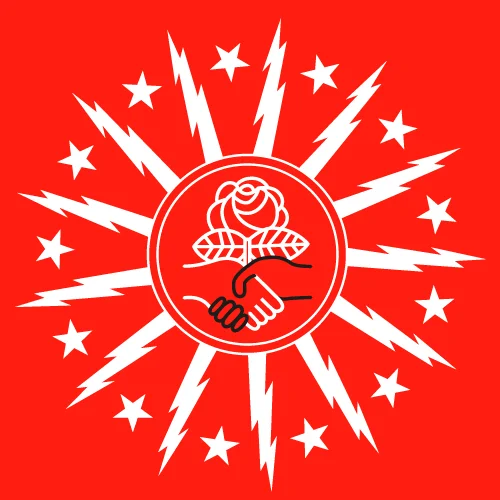

Buffalo DSA Urges Reconsideration of Broadway-Fillmore Police Training Facility
Since March 2025, Buffalo DSA has endorsed LOLA’s Communities Not Cops campaign, with overwhelming support from our general membership. As this project begins to receive the citywide attention and debate it deserves, the Buffalo DSA Steering Committee reaffirms our support of efforts to educate and agitate against a police training facility and shooting range on Paderewski Drive. We also urge all members of Buffalo DSA to follow LOLA’s calls to action re: demanding Common Councilmembers vote “NO” on the rezoning of the Paderewski Drive location, as listed on their Instagram page.
The creation of a police training facility increases the Buffalo Police Department’s capacity for targeting working-class Buffalonians through violent interventions, especially those in minority ethnic groups and within our city’s poorest communities. This is especially heinous considering Paderewski Drive was once home to a community center; we are disappointed to see the city invest in more militarized policing, rather than restoring a public civic space. This is completely counter to the just city we deserve – not just for those in the immediate neighborhood, but for working class communities citywide. We have been disappointed by the limited scope of debate around this project to this point, which suggests that only the immediate neighborhood will be impacted by this facility. We encourage comrades and neighbors to consider the larger ramifications of a police training facility of this kind.
Said limited scope of debate stems from a source actively collaborating with the Buffalo Police Department to push this project through. The Central Terminal Neighborhood Association is claiming a mandate to speak for the entire area, despite reports that opposition to the project has now spread beyond LOLA’s initial campaign, and to Broadway-Fillmore community members who have just learned about the project relative to its progress. Neighbors deserve fair representation of the project to them, rather than vague promises of a “community benefits agreement” with BPD – the details of which include only surface-level commitments toward “youth programs” in part of the facility and keeping neighborhood trees intact. We also condemn undignified smear tactics, printed or otherwise recorded publicly, that concerned citizens across Buffalo are only seeking cameras or clicks.
As the Common Council, the Buffalo Police Department, and other crucial city officials collude to advance this project via their Sep. 2 vote, we once again doubt their belief in democratic processes, and question the Central Terminal Neighborhood Association’s mandate to speak for the city on the matter.
Our chapter’s vision for demilitarized policing takes from the rich history of American socialism, notably from the legacy of American socialist Eugene V. Debs. Debs stated in 1918, after his conviction for violating the Sedition Act:
“While there is a lower class, I am in it, while there is a criminal element, I am of it, and while there is a soul in prison, I am not free.”
While we cannot speak for a long-deceased comrade, Debs’ rhetoric throughout his life demanded the liberation of the working class from oppression and tyranny. To aid and abet the tyranny of modern policing is antithetical to the American socialist tradition.


Reflecting on the 2025 National Convention
We had an absolutely fantastic time with our comrades at the 2025 DSA National Convention! Many of our Steering Committee members were serving as delegates for their chapters so we were able to catch up in person – some of us meeting IRL for the first time!
And of course – we have news to share with you regarding the direction of DSA’s national electoral work as determined by Convention as well as updates from our Socialist Cash Takes Out Capitalist Trash fundraising project!


For the NEC, Convention kicked off with us hosting an electoral-themed social on Thursday night, where participants were invited to make buttons of their favorite nationally-endorsed DSA candidates and partook in a get-to-know-you BINGO as they mingled with our candidates and electeds. The activity prompted people to meet comrades from chapters running campaigns with national endorsement, socialize with people who serve on their chapter’s electoral working groups, and connect with comrades from a variety of chapter sizes. Participants received an NEC bucket hat! 


Electoral Workshop Results

On Friday, we hosted an electoral workshop to an overflowing room of participants! 
At the NEC workshop, we had attendees complete an Electoral Program Report Card where they graded their chapter’s programs according to a variety of pillars of our electoral work (endorsements, leadership development, SIO work, etc.). We got 96 responses, which provided the NEC with an unprecedented look into our chapters’ electoral programs across the country.

The Steering Committee is pouring over the responses and will share a summary of our findings once we complete it.
Missed the workshop and want to grade your own electoral program? Check out our slides and then fill out your report card.
We also had great conversations at our table – leading to 38 applications being submitted by DSA members wishing to join the NEC.



Electoral-Related Resolutions & Amendments Passed at Convention
This convention was a pivotal one for the future of our electoral work! Check out the following resolutions which will change the course of our electoral strategy both locally and nationally.
- NEC Consensus Resolution: This resolution sets a new course for our national and local electoral work, including running candidates on independent ballot lines, updating our national endorsement criteria, creating a national socialists in office network, and issuing best endorsement practices recommendations for locals.
- Towards Deliberative Federal Endorsements: This amendment to the consensus resolution updates our federal endorsement criteria, requiring Q&As with federal candidates and more deliberation prior to endorsement.
- Carnation Program Amendment to NEC Resolution: This amendment to the consensus resolution sets a goal of running 5 candidates for Congress in 2028 running on a platform of 5 priority issues, including ending U.S. militarism, Medicare for All, and more.
- Invest in Cadre Candidates and Political Independence: This amendment to the consensus resolution commits to prioritizing running more cadre candidates at the local level, expanding the NEC’s fundraising efforts, and increasing staff capacity to support NEC.
Next Steps
We’re very excited to begin implementing these mandates from convention, including our very own NEC Consensus Resolution. If you want to help out with this important work, please join the next all-member NEC call, or if you’re not a member apply to join the NEC!
Nationally-Endorsed Slate Fundraising at Convention
National Convention was the perfect opportunity to do some fundraising for our slate of candidates! Through the QR code at the table and promotion from Chanpreet during convention, we were able to get 104 donations during convention – 54 of which were first-time donors!


Since the start of convention, we have raised an additional $6,029.94 for our slate candidates (currently Denzel McCampbell, Jake Ephros, Joel Brooks, Kelsea Bond, and Willie Burnley Jr.) on top of the $61,659.32 we had already raised so far this year!

Thank you to everyone who attended the National Electoral Commission’s events!  We hope to see you at our upcoming all-member meeting so we can get to work on implementing the mandates from convention.
We hope to see you at our upcoming all-member meeting so we can get to work on implementing the mandates from convention.
Shout-out to Cleveland DSA and Snohomish County DSA for allowing us to borrow your button makers. And thank you to Nick W for your button production run prior to convention! 
– Your National Electoral Commission Steering Committee

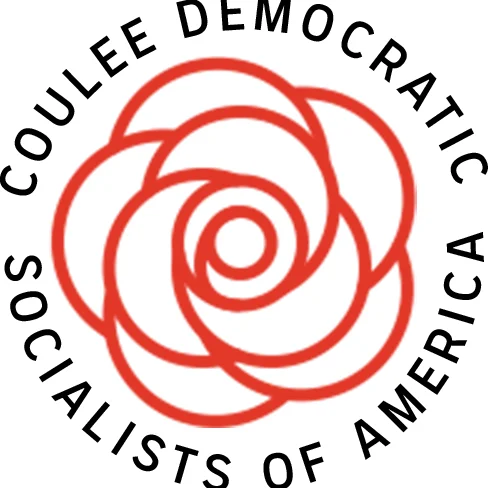

Bernie Sanders Endorsement of Rebecca Cooke A Betrayal of Socialist Movement

On August 23rd, Bernie Sanders will be hosting a “town hall” event with Rebecca Cooke, candidate in the 2026 Democratic Party 3rd Congressional District election, near Viroqua. This follows his June 19th endorsement of her. We, the Executive Committee of the Coulee Region chapter (CDSA) of the Democratic Socialists of America (DSA), denounce this endorsement and campaign event and urge Senator Sanders to withdraw this endorsement.
Senator Sanders has been a principled socialist for his entire life, and has been a leader and inspiration for millions of progressives and socialists for decades. This made his endorsement of Rebecca Cooke extremely shocking. Rebecca Cooke is no socialist, or even a progressive. She refuses to endorse Medicare For All. In 2024, she was “grateful” to be endorsed by the genocide-apologist organization Democratic Majority For Israel.1 In June of this year, she was a featured speaker at “WelcomeFest”, a convention of the anti-progressive wing of the Democratic Party, sharing the billing with genocide-apologists and neoliberals.2 In the struggle between progressives and reactionaries within the opposition to the current fascist regime, she has declared on which side she places herself- it’s not with us, and it shouldn’t be with Bernie Sanders.
There are two other candidates in this primary, namely Laura Benjamin and Emily Berge, who would make far more sense for Senator Sanders to endorse. Both have endorsed Medicare For All. Both have better stances on Palestine. Laura Benjamin is a member of DSA, is committed to socialist principles, and is a fiery public speaker. Emily Berge is firmly in the La Follette Progressive tradition and has years of experience in local elected office.
For these reasons, in the spirit of socialist comradeship, the Coulee Region chapter of Democratic Socialists Of America urges Bernie Sanders to withdraw his endorsement of Rebecca Cooke.
COULEE DSA EXECUTIVE COMMITTEE & CHIPPEWA VALLEY DSA OC, AUGUST 19th, 2025
Coulee Democratic Socialists Of America can be found at https://coulee.dsawi.org/, on Facebook, on Instagram, and by emailing couleedsa@gmail.com. Chippewa Valley DSA can be reached at chippewavalleydsa@gmail.com
1“DMFI PAC announces new endorsements in Arizona, New York, & Wisconsin” https://dmfipac.org/news-updates/press-release/dmfi-pac-announces-new-endorsements-in-arizona-new-york-wisconsin/
2“I Just Got Back From the Centrist Rally. It Was Weird as Hell.” https://www.thenation.com/article/politics/welcomefest-dispatch-centrism-abundance/
The post Bernie Sanders Endorsement of Rebecca Cooke A Betrayal of Socialist Movement first appeared on Coulee DSA.


Review: The Long Reroute, by David Duhalde
David Duhalde’s essay, “The Long Reroute: A Historical Comparison of the Debsian Socialist Party of America and the New Democratic Socialists of America,” places debates within today’s DSA in historical context while advocating for democratic decision making as the best means for resolving them. For those not familiar with the author, it’s useful to know a little bit about his background. David’s father survived Chilean fascism and imbued in him a profound faith in democratic socialism and the working class. He joined DSA in 2003, so he is just about the oldest of the new DSA. He’s held many responsible posts—from the bottom to the top and back again—in DSA over the last quarter century and is just as committed and involved today. That is a model of leadership to which all DSA cadre ought to aspire. And, as he makes clear in a footnote—always read the footnotes—he is a member of the Socialist Majority Caucus (SMC). I consider him an outstanding thinker and a good friend. I learned long ago that making friends with politicos in competing or complementary factions or organizations is one of the best ways to keep your balance under conditions not of our own choosing.
David’s essay is divided into four parts, starting with a sketch of Socialist Party history and the long metamorphosis of one part of it into today’s DSA, followed by three punchy sections comparing debates around labor, elections, and internal party organization in the SP and DSA. David admirably compresses 100 years of history into a few pages and I think his overview is an excellent primer for new DSA members. Rather than cutting ourselves off from all that messy history, David invites us to learn from it in order to fight more effectively today. And, to put it bluntly, to toughen up. Faction fights, splits and bad tempers are just as much a part of our history as are comradeship, faith, and unity.
If I’m being a critical critic, I think the first section could have been extended to focus on the causes and conflicts that led to the SPs rise and fall. For instance, David notes that the SP “steadily declined nationally in the 1920’s” after reaching 120,000 before World War I. But he doesn’t really offer us a convincing “why.” It’s a tough question and he wanted to get to his main points, but I’d like to know what he thinks. For comrades who want to know more about the contest between the SP and the CP in the 1920s and 1930s, I’d recommend perusing David’s comprehensive bibliography. If you’re interested in filling out the picture of post-WWII democratic socialism, read Chris Maisano’s A Precious Legacy in Socialist Forum. And if you buy me a beer, I’ll tell you more than you want to know about the “takeover attempt” by Trotskyists in the 1930s.
But those are minor preliminaries. The real strength of David’s piece follows in three sections dedicated to labor, elections, and internal party organization. I’ll comment on each and then conclude with a few summary remarks.
Labor
All socialists worth their salt have looked to the organized working class as the only force powerful enough to defeat the billionaire class. Exactly how to transform the proletariat from a class in itself to a class for itself (Marx’s old dictum) has been, and continues to be, easier said than done. David provides us with a useful crash course in U.S. labor history, from the Knights of Labor to the AFL to the IWW and the CIO and traces how competing strategies divided sections of the socialist movement. I think he’s right to highlight that today’s DSA, with the benefit of hindsight, has managed to coalesce around some of the most successful of these strategies, what we might call a flexible rank-and-file approach. As he notes, “While this strategy was not universally accepted when it was proposed in 2019—many veteran DSAers were uneasy with publicly siding in internal union disputes and elections—it has gained more widespread acceptance among different caucuses and factions of DSA over the last few years.” I don’t think it’s possible to overstate just how important this insight is and David is correct to draw attention to it. This ethos is not the property of one or another caucus, but represents the shared experience and intelligence of thousands of DSA members fighting to build durable labor unions.
Elections
David points out that the Debsian-era SP’s electoral strategy had sought political independence from the beginning. Electoral independence did not constitute a left v. right tension. Remember, the Democratic Party of this era was the party of the Klan in the South and Tammany Hall in the North. Debs and Berger both wanted an independent Socialist ballot line. There’s a lot more to say about what happened in the 1930s during the New Deal, but David concentrates on how a section of the SP—led by Michael Harrington in the Democratic Socialist Organizing Committee in the 1960s and 1970s—hit on the strategy of “realignment,” which aimed to transform the Democratic Party into a kind of social democratic party. The results were, generously, a mixed bag.
Today’s DSA has adopted, according to David, a new strategy, “contesting Democratic primaries as the main arena for struggle,” typically conceived of as preparing for a “dirty break”—or a “dirty stay,” as David has suggested elsewhere—with the Democrats. Just how and when and under what circumstances such a break might occur, has led to “serious tensions” inside DSA today. As he puts it, “unity around the mere idea of being or becoming a party does not necessarily result in consensus around how the party and its elected officials should operate, especially together.” Although David’s SMC caucus has a definite view on this question, here David raises a political conundrum that all of DSA will have to confront, namely, “the polarization today between the Democratic and Republican parties, which did not exist when the Socialist Party operated,” adding how such polarization “makes voters more partisan and less open to new options.” He concludes that “Democratic voters may be happy to vote for socialists within primaries, but may not want to vote for the same candidate if they ran on another line.” The road to any kind of break leads through demonstrating, in practice, how to overcome this dilemma.
Internal organization
This final section of David’s analysis contains—and it ought to—his most controversial assertions. Rather than shy away from the debate, or paper over disagreements, David makes a clear case for how he believes internal debates are most fruitfully resolved. I would characterize David’s view as a strong belief in the efficacy of conducting and resolving political debates within DSA’s structures, however imperfect they may be. There’s simply no other way to settle sharp disputes. At times, as has been common in the past, that turns out to be impossible and some comrades may decide to leave. For example, David summarizes the case of several debates around Palestine:
1. The factions and partners in the new DSA can change but the program such as Palestine solidarity will continue. 2. These disagreements are largely born out of internal, “homegrown” struggles over major strategic disagreements about how to approach politics. Both groupings who departed DSA were active in the organization as individual members, not as outsiders trying to influence DSA policy to foster splits. People leave when they feel they can no longer achieve their objectives through the existing democratic process.
Turning to factionalism, David argues there are two principle kinds: entryism and homegrown. In terms of entryism, I differ with his view—it’s overly generalized and defensive—but I’ll leave that discussion for another time. I will simply point out the danger that lumping together any future organizational merger with different political tendencies—whether they emerge from labor, civil rights, or other socialist movements—under the banner of “entryism” can be counterproductive. For instance, longtime—and now former—DSA member Maurice Isserman placed the “blame” for DSA’s forthright defense of Gaza on unnamed “entryists.”
More fruitful, in my view, is David’s description—drawing on his discussion with Bill Fletcher–of the new DSA as “an unplanned left-wing refoundation.” That is, “the idea that a stronger left is possible through both regroupment of existing radical structures into a new formation alongside the rethinking and retooling of current left-wing strategy into an alternative orientation.” Of course, there is a difference between an entryist smash and grab operation and honest regroupment, my only point is that comrades should be careful not to paint any organizational regroupment as necessarily entryism with a negative sign placed above the latter. David, I believe, provides the tools to do so by placing his matter-of-fact summaries of the many homegrown caucuses within DSA next to his observation that some of those caucuses have “external influences,” which is only natural and to be expected. In fact, those influences are a sign of DSA’s openness and vitality, not a weakness. As such, “factionalism” is just a normal consequence of any genuinely democratic organization, especially one that has grown as explosively as DSA. As David explains,
DSA’s factionalism is homegrown. Simply put, the divisions and debates originate largely within DSA, not outside of it. For the hundreds of members who were long-time members of other organizations before joining DSA, tens of thousands more had their first experience in a political organization, much less a socialist one, in DSA. These two groups do interact with each other and many of the caucuses have external influences—both contemporary and historic. Every grouping has their own unique history.
David is, I think, right to downplay generational conflict within DSA, although he does note that older and more experienced members can have difficulty adapting to new melodies and—to extend Irving Howe’s metaphor—new and younger members might not recognize the lyrics. My only quibble here is that David’s one example of intergenerational dynamics is the resignation of some long-term, high-profile members over DSA’s forthright defense of Gaza. That is certainly worth pointing out. But I would also point out that—to my understanding—the “old guard” welcomed the transformation of the organization in 2017. That decision to turn over the keys to the newbies represents an act of political perspicacity on the part of DSA’s veterans and, in my experience, is not as common as one might hope. Of course, David’s own middling generation, those who joined between 9/11 and Bernie 2016, represented a mediating layer of cadre who paved the way for mass growth by creating institutions such as Jacobin and revitalizing YDSA. It’s a lesson that the new generation of DSA cadre should take to heart as we prepare for larger influxes of new socialists and new phases in the ongoing “unplanned left-wing refoundation.”
Lastly, The Long Reroute fits squarely into an undervalued category of what I might call cadre writing. It is a form of exposition that draws on academic and specialist knowledge, but extracts political value expressly designed to speak to socialist organizers and leaders. The general public may get something out of it, although they may well be overwhelmed by all the history and acronyms. And academics may well dismiss it as lacking in original archival research, even as the best of them engage with it. It’s just what the doctor ordered for DSA’s developing cadre, that is, our most active and dedicated members who aspire to help lead DSA on both a national and local level. David’s work provides a framework and language for raising our cadre’s sophistication and capabilities and expands the possibility for caucus and non-caucus cadre to communicate and collaborate, even while debates rage on. It is a must read.
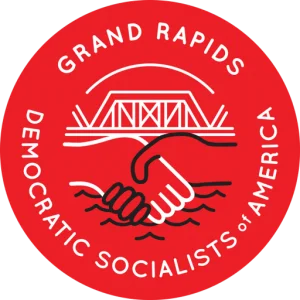

Concentration Camp in Your Community: Discussing the Baldwin ICE Detention Center with the GRDSA
We’ll be hosting our next Greenville event on Saturday, August 23rd, from 2-4 pm at the Flat River Community Library.

We’ll be discussing Trump’s new ICE Detention Center in Baldwin, Michigan. The conversation will center around the racist anti-immigrant efforts rising around us, why we’re against them, and what we can do about it!
RSVP to the event here, and share the details with a friend! We’re looking forward to a robust discussion with you.
The post Concentration Camp in Your Community: Discussing the Baldwin ICE Detention Center with the GRDSA appeared first on Grand Rapids Democratic Socialists of America.


Exert Your Right to Mask!
by Sam K.
Rights are not rights if we don’t use them, and we must use exercise them openly, frequently, and without reservation.
I don’t usually talk about masking very much, I just do it. I find people talk to me about masking more than I talk to them about it. The act of masking causes others to reflect; perhaps to feel some sort of guilt about themselves, or judgement about me and other maskers. This one time, let me make the case for masking for 2025 and the foreseeable future.
The techno-surveillance police state is already here – its gradually cemented itself in the digital and physical world we navigate our lives through. After 9/11, the normalization of surveillance has evolved from an initial public support for sacrificing freedoms for supposed “public safety,” to the shocking revelations of Edward Snowden’s whistleblowing, to an almost pathetic view of the security theater of going through TSA. Cameras are watching us in the sky – far enough away where we cannot seem them, but precise enough to see details on the ground. Many people tend to feel hopeless about avoiding such surveillance when thinking about this – but hope is not lost. The Electronic Frontier Foundation has been fighting for digital privacy rights for decades, paving the way for alternatives to Big Tech such as the Graphene OS android operating system, Proton emerging as a Google suite alternative, and the more widespread adoption of Signal. The use of these digital tools help to shield us from the surveillance state, but the digital privacy community and socialist organizers are failing to discuss how we can protect ourselves from both the surveillance state and fascist forces in public. Being tracked by the state or being doxxed and identified by fascist forces are real threats we must confront head-on.
Historically, bans on facial coverings have a mixed history in the United States. One the one hand, there were some 20th century laws passed in various states in efforts to crack down the Klu Klux Klan, while later being applied to Occupy Movements. On the other hand, In 1845, New York State passed an anti-mask law for “public safety” after a tenants’ revolt, known as the Anti-Rent War, or the Helderberg War. Many states, and the District of Columbia, either already have anti-mask laws on the books, have pushed for them recently, or likely will continue to push for them. While the legal statuses have been challenged and some have been struck down by the Supreme Court, we know these liberal institutions have already failed us, and will continue to enable fascism.
So, what happens when ICE starts going after socialists? Will you wear a mask to a protest or at court watching? What will you do when a police officer or a masked ICE agent claims you cannot wear a mask because you’re hiding your identity and you might be a terrorist? Will you comply, or will you disobey, whether legal or not? Will you start coughing, or will you verbally argue the necessity of masking to protect yourself from a contagious virus that can cause young, otherwise healthy people to become disabled and immuno-compromised? Actions speak louder than words.
I’ve now contracted covid-19 three times, the third leaving me with a compromised immune system and GI reactions to some of my favorite foods – which I had been eating during isolating and recovering from the third infection. Wearing good masks that fit your face absolutely works to protect yourself from covid-19, other viruses, and those brutal Austin allergies, too! Maybe you still don’t care about covid-19, and I don’t think I can convince you with words. But the reality is, you cannot mask only for protection from the fascist forces; you must also mask for your protection from airborne viruses. Otherwise, your masking would be atypical. It would signal a divergence in your regular behavior. Our safety and security practices are for all of the time. We always wear our seat belts, not just right before we get into a collision. Normalizing masking in 2025 and onward is a matter of practice, and just doing it. Do it at the grocery store, do it at your work place. Do it inside, and do it outside. Do it to protect yourself, and do it to remind others to do it – because actions speak louder than words. Exert your right to mask, and do it now – before its too late.
The post Exert Your Right to Mask! first appeared on Red Fault.
